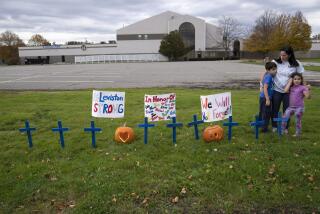Canadian cop killer manhunt raises questions about gun control
Canadian authorities launched a massive manhunt for a heavily armed gunman who killed three police officers and wounded two others in a rampage that is rare in Canada when compared to the United States and again raises questions about the effectiveness of gun-control laws in curbing such incidents.
No one would contend that tougher gun-control laws like those in Canada are solely responsible for discouraging all crime and violence. But advocates for such laws point to Canada’s lower rate of firearm-related homicides as evidence that limiting the availability of weapons has some effect.
When it comes to the type of rampages that permanently scar the public psyche, Americans can point to shootings in Isla Vista, Calif.; Newtown, Conn.; Aurora and Littleton, Colo.; and Tucson, Ariz.
Before Wednesday’s tragedy in the province of New Brunswick, the last major attack on police in Canada was in 2005 when four Royal Canadian Mounted Police officers were killed in the western province of Alberta. That attack, in which the gunman was killed, was the worst against police in 120 years.
In this week’s attack, the RCMP said police responded to a call of an armed man in the north end of the city of Moncton at about 7:30 p.m. Wednesday. Authorities on Thursday were searching for the suspect, Justin Bourque, 24, who witnesses say was wearing camouflage and carrying two rifles when he began firing on officers. Three of the officers were killed; the two wounded officers were in stable condition Thursday.
Such violence is rare in Canada, particularly on the East Coast. Officials said Moncton hadn’t had a homicide since 2012 until Wednesday’s attack.
“We have been blessed until this point,” Mayor George LeBlanc told the Associated Press.
According to a Canadian government analysis, Canada ranked fourth in a comparison of selected countries in firearm-related homicides in 2012 with 0.5 per 100,000 population. The United States, which holds the dubious distinction of being in first place, recorded about 3.5 homicides per 100,000 people. The lowest rate was in Japan, which arguably has the toughest gun-control laws in the world.
Gun ownership in Canada was about 23.8 firearms per 100 people. By comparison, according to U.S. statistics, Americans own roughly 310 million weapons of all types, or about one gun for every person.
The question is why are there wide differences between the U.S. and Canada. Both countries have areas with a Wild West, shoot-’em-up tradition. Hollywood-produced violence goes over the airwaves of both countries. Online violence is readily available in both. Each even has the same roots in English law. That is why some argue the difference is in legislation.
In general, Canadian civilians aren’t allowed to possess automatic weapons, handguns with a short barrel (which are easier to hide) or any modified handgun, rifle or shotgun. Most semiautomatic assault weapons are also banned. As a result of exemptions, several kinds of assault weapons are still legal in Canada.
In general, it takes 60 days to buy a gun in Canada and there is mandatory licensing, including outside references and required safety courses. Background checks look at mental and addiction histories. In general, licenses are denied to applicants with a history of mental illness or domestic violence.
By comparison, the United States is a relatively open market. On the federal level, most gun-control legislation has been stymied, even after the recent spate of massacres. Some states have tougher regulations than other, including limits on the size of magazines and licensing requirements. But in a country as large as the United States, that usually means that someone who can’t buy a gun in their home state can go to another state or to the Internet.
And, of course, gun-control requirements only apply to legal weapons. The United States also has a large market in illegal weapons.
More to Read
Start your day right
Sign up for Essential California for news, features and recommendations from the L.A. Times and beyond in your inbox six days a week.
You may occasionally receive promotional content from the Los Angeles Times.







